- Home
- Nick Hornby
Fever Pitch Page 20
Fever Pitch Read online
Page 20
Gus Caesar
ARSENAL v LUTON
(at Wembley) 24.4.88
The Littlewoods Cup Final that year was a disaster, and sometimes I still find myself drifting back to it: 2–1 up with ten minutes left, and at the end of one of the most one-sided periods of football I have ever seen (Hayes hits the post, Smith hits the bar, Smith one-on-one with Dibble but doesn’t beat him), the ball is on the penalty spot after Rocky has been brought down and Winterburn is about to…
No. He’s missed it again, for the fortieth or fiftieth time since that April afternoon. My daydreams are so vivid that I really do find it hard to believe that he won’t get another chance sometime, and my re-emergence back into my underground journey, or the book I am reading, is ludicrously slow, only achievable once I have forced myself to recognise, sometimes by saying the words under my breath, that the game is over, finished, and will never be played again. But you see, if Winterburn had scored (and why did none of the others volunteer to take it? A Wembley final isn’t the place to take your first one), we would have won 3–1, no question, and retained the Cup we had won the year before; but he didn’t, and Luton went up the other end and scored twice in the last seven minutes and won 3–2. Fairly or unfairly, the Arsenal fans I have spoken to blame one man: Augustus Caesar.
There have been so many players that the crowd have rubbished over the years, and not all of them were bad: Ure, Sammels, Blockley, Rix, Chapman, Hayes, Groves, even Michael Thomas for the second half of the first Championship season and a good chunk of the following year. But Gus was different. There was no debate whatsoever about his talents. Hayes, Groves, Thomas, and Rix all had their defenders among the fans, but Gus had none, or none that I ever came across; the nadir of his Arsenal career was probably during a horrible 1–0 defeat at Wimbledon in January 1990, when every back-pass or clearance he accomplished without disaster was greeted with ironic cheers and applause for the entire game. I can’t begin to imagine how anyone could ever cope with that kind of public humiliation.
Soon after I had stopped teaching and begun to try to write, I read a book called The Hustler by Walter Tevis. I was much taken by Fast Eddie, the character played by Paul Newman in the film, just as I had been much taken with the notion that I was the Cannonball Kid when Charlie Nicholas moved down from Celtic. And as the book seemed to be about anything you wanted to do that was difficult – writing, becoming a footballer, whatever – I paid it extra special attention. At one point (oh God oh God oh God) I typed these words out on a piece of paper and pinned it above my desk:
‘That’s what the whole goddamned thing is: you got to commit yourself to the life you picked. And you picked it – most people don’t even do that. You’re smart and you’re young and you’ve got, like I said before, talent.’
As the rejection slips piled up, these words comforted me; and as I began to panic about the way things that everybody else had, like careers and nice flats and a bit of cash for the weekend, seemed to be slipping out of arm’s reach, friends and family began to try to reassure me. ‘You know you’re good,’ they said. ‘You’ll be OK. Just be patient.’ And I did know I was good, and I had committed myself to the life I had picked, and my friends, and Fast Eddie’s friends, couldn’t all be wrong, so I sat back and waited. I know now that I was wrong, stupid, to do so, and I know because Gus Caesar told me so.
Gus is living proof that this self-belief, this driven sense of vocation (and I am not talking about arrogance here, but the simple healthy self-confidence that is absolutely necessary for survival), can be viciously misleading. Did Gus commit himself to the life he had picked? Of course he did. You don’t get anywhere near the first team of a major First Division football club without commitment. And did he know he was good? He must have done, and justifiably so. Think about it. At school he must have been much, much better than his peers, so he gets picked for the school team, and then some representative side, South London Boys or what have you; and he’s still better than anyone else in the team, by miles, so the scouts come to watch, and he’s offered an apprenticeship not with Fulham or Brentford or even West Ham but with the mighty Arsenal. And it’s still not over, even then, because if you look at any First Division youth team of five years ago you won’t recognise most of the names, because most of them have disappeared. (Here’s the Arsenal youth team of April 1987, from a randomly plucked programme: Miller, Hannigan, McGregor, Hillier, Scully, Carstairs, Connelly, Rivero, Cagigao, S. Ball, Esqulant. Of those, only Hillier has come through, although Miller is still with us as a highly rated reserve goalkeeper; Scully is still playing professional football somewhere, though not for Arsenal or any other First Division team. The rest have gone, and gone from a club famous for giving its own players a fair crack.)
But Gus survives, and goes on to play for the reserves. And suddenly, it’s all on for him: Don Howe is in trouble, and flooding the first team with young players – Niall Quinn, Hayes, Rocastle, Adams, Martin Keown. And when Viv Anderson is suspended over Christmas 1985 Gus makes his début, as a right-back, at of all places Old Trafford, and we win 1–0 up there, so he’s part of a back four that’s kept a clean sheet away at Manchester United.
Howe gets the sack, and George Graham keeps him on, and he’s used as a sub in quite a few games over George’s first season, so things are still going well for him – not as well as they are for Rocky and Hayes and Adams and Quinn, but then these players are having an exceptional first full season, and when the squad for the England Under-21s is announced it’s full of Arsenal players, and Gus Caesar is one of them. The England selectors, like the Arsenal fans, are beginning to trust Arsenal’s youth policy implicitly, and Gus gets a call-up even though he isn’t in the first team regularly. But never mind why, he’s in, he’s recognised as one of the best twenty or so young players in the whole country.
Now at this point Gus could be forgiven for relaxing his guard a little. He’s young, he’s got talent, he’s committed to the life he’s picked, and at least some of the self-doubt that plagues everyone with long-shot dreams must have vanished by now. At this stage you have to rely on the judgement of others (I was relying on the judgements of friends and agents and anyone I could find who would read my stuff and tell me it was OK); and when those others include two Arsenal managers and an England coach then you probably reckon that there isn’t much to worry about.
But as it turns out, they are all wrong. So far he has leaped over every hurdle in his path comfortably, but even at this late stage it is possible to be tripped up. Probably the first time we notice that things aren’t right is in January 1987, in that first-leg semi-final against Tottenham: Caesar is painfully, obviously, out of his depth against those Spurs forwards. In truth he looks like a rabbit caught in headlights, frozen to the spot until Waddle or Allen or somebody runs him over, and then he starts to thrash about, horribly and pitifully, and finally George and Theo Foley put him out of his misery by substituting him. He doesn’t get another chance for a while. The next time I remember him turning out is against Chelsea at Stamford Bridge in a 1–1 draw, a week or two before the Luton final, but again there is a moment in the first half where Dixon runs at him, turns him one way, then the other, then back again, like your dad used to do to you when you were a really little kid in the back garden, and eventually strolls past him and puts the ball just the wrong side of the post. We knew that there was going to be trouble at Wembley, when O’Leary was out injured and Gus was the only candidate to replace him. Caesar leaves it late, but when the ball is knocked into the box seven minutes from time, he miskicks so violently that he falls over; at this point he looks like somebody off the street who has won a competition to appear as a centre-half in a Wembley final, and not like a professional footballer at all, and in the ensuing chaos Danny Wilson stoops to head the ball over the line for Luton’s equalising goal.
That’s it. End of story. He’s at the club for another three or four years, but he’s very much the last resort centre-back, and he
must have known, when George bought Bould and then Linighan and then Pates, with Adams and O’Leary already at the club, that he didn’t have much of a future – he was the sixth in line for two positions. He was given a free transfer at the end of the 90/91 season, to Cambridge United; but within another couple of months they let him go too, to Bristol City, and a couple of months after that Bristol City let him go to Airdrie. To get where he did, Gus Caesar clearly had more talent than nearly everyone of his generation (the rest of us can only dream about having his kind of skill) and it still wasn’t quite enough.
Sport and life, especially the arty life, are not exactly analogous. One of the great things about sport is its cruel clarity: there is no such thing, for example, as a bad one-hundred-metre runner, or a hopeless centre-half who got lucky; in sport, you get found out. Nor is there such a thing as an unknown genius striker starving in a garret somewhere, because the scouting system is foolproof. (Everyone gets watched.) There are, however, plenty of bad actors or musicians or writers making a decent living, people who happened to be in the right place at the right time, or knew the right people, or whose talents have been misunderstood or overestimated. Even so, I think there is a real resonance in the Gus Caesar story: it contains a terrifying lesson for any aspirants who think that their own unshakeable sense of destiny (and again, this sense of destiny is not to be confused with arrogance – Gus Caesar was not an arrogant footballer) is significant. Gus must have known he was good, just as any pop band who has ever played the Marquee know they are destined for Madison Square Garden and an NM E front cover, and just as any writer who has sent off a completed manuscript to Faber and Faber knows that he is two years away from the Booker. You trust that feeling with your life, you feel the strength and determination it gives you coursing through your veins like heroin… and it doesn’t mean anything at all.
Walking Distance
ARSENAL v SHEFFIELD WEDNESDAY
21.1.89
It made sense to move into the area, for other reasons too: your money goes a lot further in decrepit areas of north London than it does in Shepherd’s Bush or Notting Hill, and the public transport up here is good (five minutes from King’s Cross, two tube lines, millions of buses). But really, living within walking distance of the ground was the fulfilment of a pitiful twenty-year ambition, and it’s no use trying to dress it up in logic.
It was fun looking. One flat I saw had a roof terrace which overlooked a section of the front of the stadium, and you could see these huge letters, ‘RSEN’, no more than that but just enough to get the blood pumping. And the place we got gazumped on was on the route that the open-top bus takes when we win something. The rooms were smaller and darker than the ones we have now, but the living-room window framed the entire West Stand; I would have been able to pause, during the writing of this book, look out, and return to the Amstrad refreshed.
In the end we had to settle for somewhere a little less spiritual overlooking Finsbury Park, and even if you stand on a stool and stick your head out of the window you can’t see anything, not even the Barclays League pennant which at the time of writing (although not, I fear, for much longer) is still ours to flutter. But still! People park their cars in our road before the game! And on a windy day the tannoy is clearly audible, even from inside the flat, if the windows are open! (I don’t know about the audibility of roars, obviously, because I am never at home when the team are, but I would like to think that the noisier celebrations make it this far. Maybe one day I will borrow my brother-in-law’s smart Sony recorder, place it on the chair by the TV under the window and let it run, just out of interest.) And best of all, just a few days after moving in, I was walking down the road – this really happened – and I found, just lying there, filthy dirty and somewhat torn but there nonetheless, a twenty-year-old Peter Marinello bubblegum card. You cannot imagine how happy this made me, to know that I was living in an area so rich in archaeological interest, so steeped in my own past.
As we turned the corner into our new street, the rental-van radio brought us news of a Kevin Richardson goal at Goodison Park, the third in an eventual 3–1 win (and Everton’s goal never crossed the line), which seemed like a pretty good omen. But I was waiting for the following Saturday, my first ever home home game against Sheffield Wednesday, when finally, at the age of thirty-one, I would walk down Avenell Road, through the turnstiles and on to the North Bank as a north Londoner.
What was I expecting to find, when I opened the front door on to the street at twenty to three (twenty to three!) that Saturday afternoon and turned right towards the ground? I imagine I thought it was going to be like one of those sitcom depictions of suburbia, with all the identical front doors opening at precisely the same time, and identically dressed men marching down the street together, clutching identical briefcases, brollies and newspapers. In my street, of course, it would be Arsenal supporters, rather than commuters, who emerged, and they would all be wearing flat caps and faded bar-type red-and-white scarves. And they would see me and smile and wave, and I would immediately become a much-loved and valued member of a happy, working-class Arsenal community.
But no doors opened. Nobody supports Arsenal in my street. Some of my neighbours are what used to be known, years ago, as yuppies, and they have no interest in football; others are transients, squatters or short-lease tenants, never around for long enough to acquire the taste for it. The rest of them… I don’t know. You can’t come up with a theory for everyone, and there’s no accounting for taste. All I know is that there used to be one other fan in our street, a young lad who wandered around in an away shirt, but he moved soon after we got here; and apart from him I could have been back in Maidenhead, were it not for the cars cruising up and down, looking for a matchday parking space.
I suspect that I moved here a good twenty years too late, and that for the last couple of decades the local support has dwindled away steadily. According to the club’s information, a huge percentage of fans live in the Home Counties (when I travelled down from Cambridge, the trains were packed with Arsenal supporters by the time we got to Hatfield). Football in London – at Spurs, Chelsea, Highbury and, to a lesser extent, West Ham – has become a suburban afternoon out. The demographics have changed now, and all those people who used to walk to the game from Islington and Finsbury Park and Stoke Newington have gone: they’re either dead or they’ve sold up, moved out to Essex or Hertfordshire or Middlesex. And though you see a fair few people walking around with club shirts on, and some of the shopkeepers take an interest in the results (one of the guys who runs the news-stand inside the station is a committed and knowledgeable fan, although his brother supports Chelsea), I’m more alone here than I ever thought I would be at the end of the sixties, all those years ago, when I used to pester my dad to buy a house on Avenell Road, and he said I’d get fed up with it.
Tyranny
ARSENAL v CHARLTON
21.3.89
I’m writing about me, now. The boy who fretted his way through the first part of this book has gone; the young man who spent most of his twenties twisted in on himself isn’t around either. I can no longer use age, or rather youth, to explain myself in the way I have been able to do elsewhere.
As I get older, the tyranny that football exerts over my life, and therefore over the lives of people around me, is less reasonable and less attractive. Family and friends know, after long years of wearying experience, that the fixture list always has the last word in any arrangement; they understand, or at least accept, that christenings or weddings or any gatherings, which in other families would take unquestioned precedence, can only be plotted after consultation. So football is regarded as a given disability that has to be worked around. If I were wheelchair-bound, nobody close to me would organise anything in a top-floor flat, so why would they plan anything for a winter Saturday afternoon?
Like everyone, I have a peripheral role to play in the lives of most of the people I know, however, and these people are often uninterested in the
forthcoming First Division programme. So there have been wedding invitations that I have reluctantly but unavoidably had to turn down, although I am always careful to provide a socially acceptable excuse involving family problems or work difficulties; ‘Home to Sheffield United’ is deemed an inadequate explanation in situations like these.
And then there are the unpredictable Cup replays, the rearranged midweek fixtures, the games transferred from Saturday to Sunday at short notice in order to accommodate the television schedules, so I have to refuse invitations that clash with potential fixtures, as well as those which clash with actual fixtures. (Or I do arrange something, but warn the parties involved that I might have to pull out at the last moment, which sometimes doesn’t go down too well.)
But it gets harder and harder, and sometimes hurting someone is unavoidable. The Charlton game was rearranged for the same night as a very close friend’s birthday party, a party to which only five people had been invited. Once I realised that there was a conflict of interest, there was the usual brief panic as I contemplated a home game taking place without me; and then I phoned her with a heavy heart and told her what had happened. I was hoping for a laugh and absolution, but I got neither, and from the sound of her voice, from the disappointment and tired impatience it contained, I understood that I wasn’t going to. Instead, she said one of those awful things, ‘You must do what you think is right’, or ‘You must do what you want to do’, something like that; one of those chilling deliverances designed to find you out, and I said that I’d have to think about it, but we both knew that I wasn’t going to think about it at all, that I had been exposed as the worthless, shallow worm I was, and I went to the game. I was glad I went, too. Paul Davis scored one of the best goals I have ever seen at Highbury, a diving header after he’d sprinted the length of the pitch following a Charlton attack.

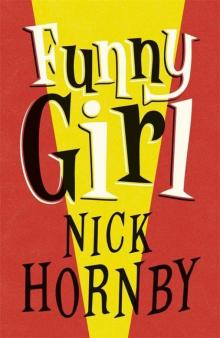 Funny Girl
Funny Girl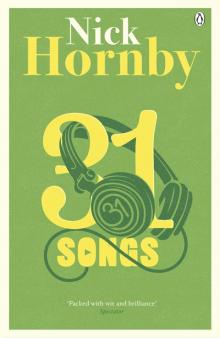 31 Songs
31 Songs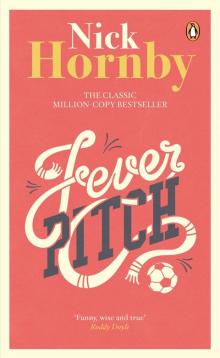 Fever Pitch
Fever Pitch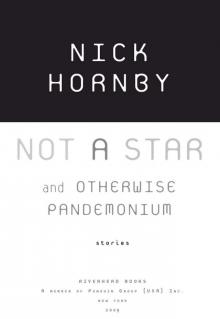 Not a Star and Otherwise Pandemonium
Not a Star and Otherwise Pandemonium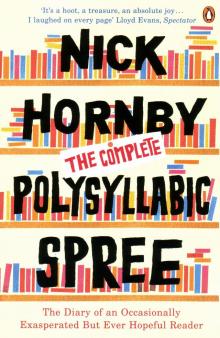 The Complete Polysyllabic Spree
The Complete Polysyllabic Spree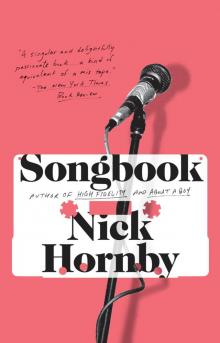 Songbook
Songbook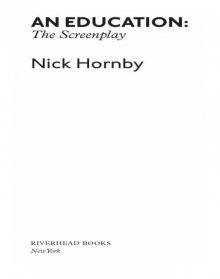 An Education
An Education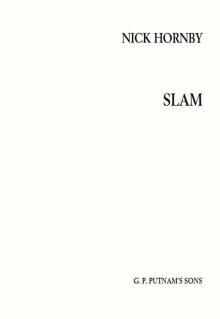 Slam
Slam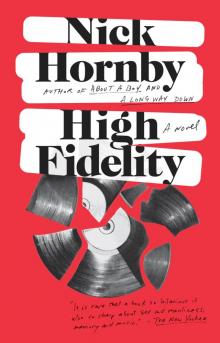 High Fidelity
High Fidelity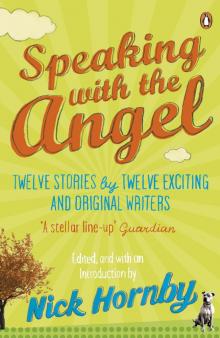 Speaking With the Angel
Speaking With the Angel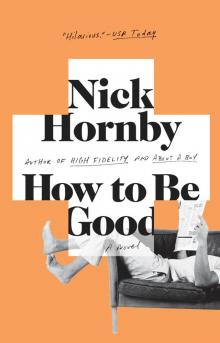 How to Be Good
How to Be Good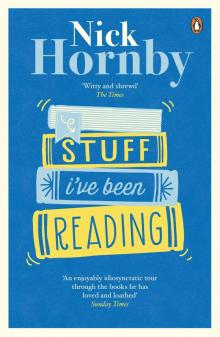 Stuff I've Been Reading
Stuff I've Been Reading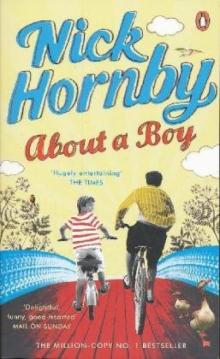 About a Boy
About a Boy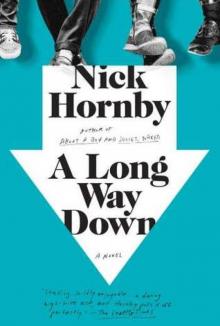 A Long Way Down
A Long Way Down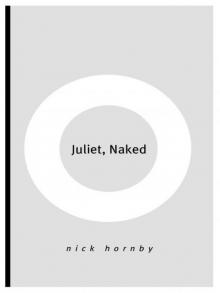 Juliet, Naked
Juliet, Naked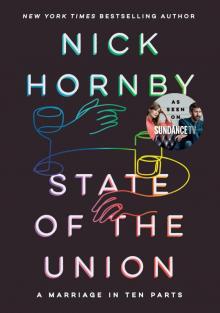 State of the Union
State of the Union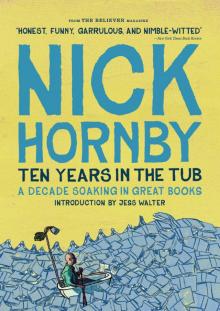 Ten Years in the Tub: A Decade Soaking in Great Books
Ten Years in the Tub: A Decade Soaking in Great Books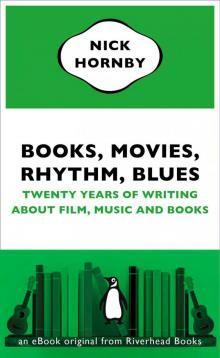 Books, Movies, Rhythm, Blues: Twenty Years of Writing About Film, Music and Books
Books, Movies, Rhythm, Blues: Twenty Years of Writing About Film, Music and Books Just Like You
Just Like You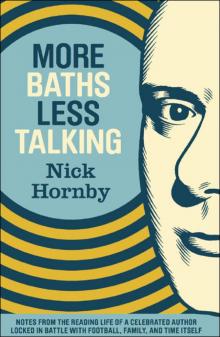 More Baths Less Talking
More Baths Less Talking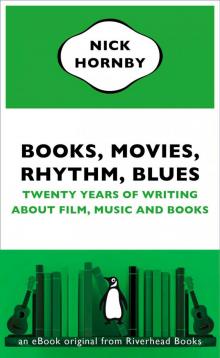 Books, Movies, Rhythm, Blues
Books, Movies, Rhythm, Blues